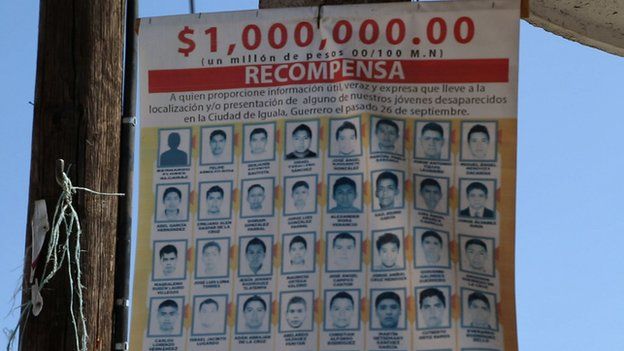Is social media fuelling a Mexican Spring?
- Published

If you live far from Mexico and you've heard of the 43 missing students of Ayotzinapa teachers training college, the chances are that a highly tactical online awareness campaign, involving thousands of Mexicans angry with their government, has had something to do with it.
The students were left-wingers, on their way to a protest.
An official report later found that, after police clashed with them and killed six on the spot, the local mayor ordered the remaining 43 to be detained.
They were handed over to a drug cartel and never heard from again - the official report says they were murdered and burnt.
But when I visited the actual dusty spot in Guerrero state where the students clashed with police, I found only a few bullet holes in a wall, a couple of crosses in the ground and some hashtag graffiti on a wall.
The lack of a memorial indicates how, sadly, even such levels of gruesome violence are not unheard of in Mexico's drug wars.
BBC Trending has been using Facebook to track several new cases since, as we will be reporting next week on Newsnight.
So why did this one story become so iconic and politically toxic?
Digital radicals
Part of the reason is that it was embraced by a clever group of digital radicals who made it trend.
Late last year, we reported on the "I am Tired" (#YaMeCanse) hashtag, which trended globally for weeks and has now been used more than 4 million times.
The phrase "I am tired" was used by the Mexican attorney general Jesus Murillo Karam, as he closed a press conference about the missing students.
Many started to use the phrase in anger on Twitter, but what was striking was how - within just 60 minutes - a blogger who wouldn't tell us his real name had started a sophisticated campaign to make it a global trend, and turn it into street protests.
That anonymous blogger has been at the heart of several angry online campaigns since.
He agreed to meet me, and reveal his name, in a Mexico City cafe earlier this week.
Alberto Ecsorcia is 35, a freelance social media marketing consultant, who says he does all of this in his own time - and says he has no links to political parties.
But he does have links to an international political movement: the anti-austerity 15M movement in Spain, which he has visited to study its online tactics.
15M is seen by many has having paved the way for the Podemos political party. They in turn reportedly used social media tactics borrowed from the revolutions in Tunisia and Egypt.
So Alberto draws inspiration from global movements that aimed to unseat governments.
Applying pressure
He is keeping the pressure up.
In the past few days, he has created and driven another hashtag, #MexicoWantsAristeguiBack, into the global top ten trending topics - Carmen Aristegui is an investigative journalist here who was recently sacked by her employers.
The hashtag, which is notably in English, has been used 250,000 times.
He maintains that all of these tweets are real people - not "bots" or fake accounts, which he accuses the government of using.
Most are aged 19 to 30, he says, many of them students.
So is his end game, like Podemos in Spain or Syriza in Greece, to unseat the government?
He says no, because to do that would lead to civil war.
"Mexico is fragmented," he says.
The power of cartels and gangs means "the situation here is closer to a civil war than to democracy. All I am trying to do is work in peaceful ways and avoid violence".
But all of his hashtags seem to mobilise righteous anger against the government, and particularly President Enrique Pena Nieto, for all of Mexico's complex problems.
I ask him: is he peddling a simplified solution to people desperate to reduce violence in their country?
"People are not dumb, they know this is all tactics," he says.
"You have to apply pressure to change things."
The situation in Mexico is much more complex than the online picture suggests.
Street protests, cartel violence, political corruption, all affect the country's politics.
But the hashtag campaigns are a potent new part of the mix.
BBC Trending will be broadcasting an hour-long special from Mexico on Saturday on the BBC World Service. Subscribe to our podcast to catch it.